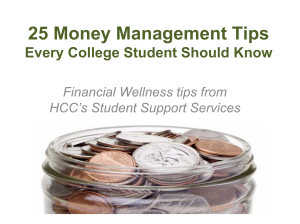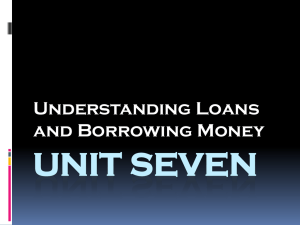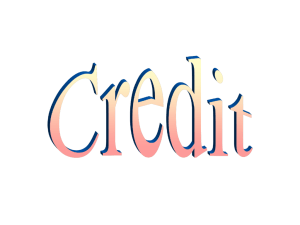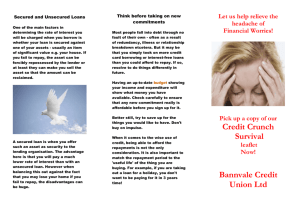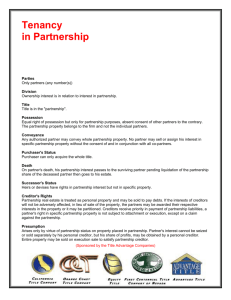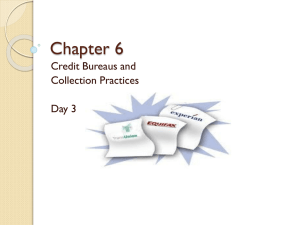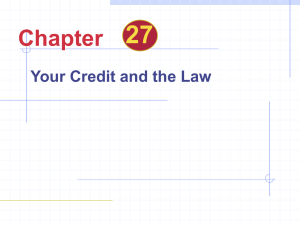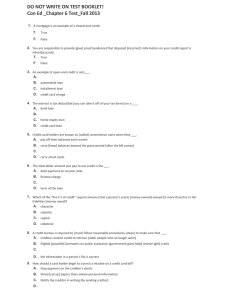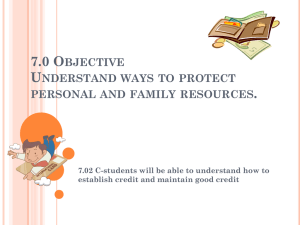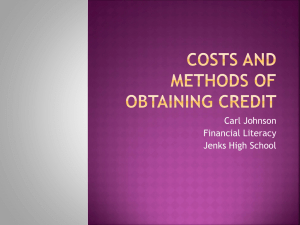Budget 17 - Getting a Credit History
advertisement
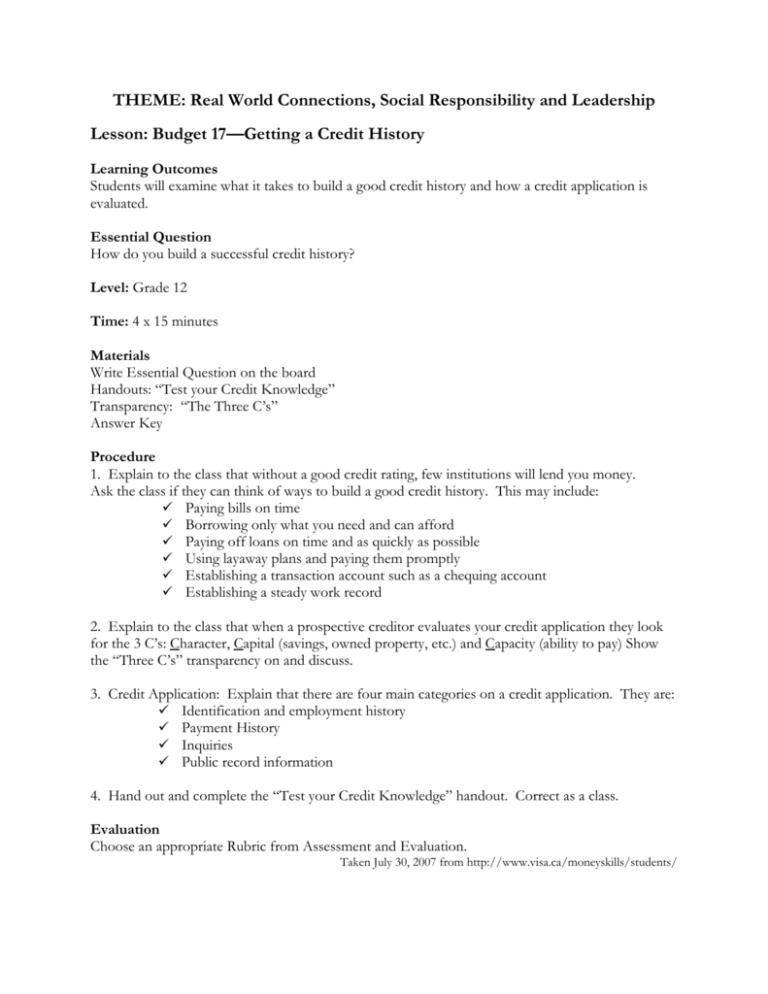
THEME: Real World Connections, Social Responsibility and Leadership Lesson: Budget 17—Getting a Credit History Learning Outcomes Students will examine what it takes to build a good credit history and how a credit application is evaluated. Essential Question How do you build a successful credit history? Level: Grade 12 Time: 4 x 15 minutes Materials Write Essential Question on the board Handouts: “Test your Credit Knowledge” Transparency: “The Three C’s” Answer Key Procedure 1. Explain to the class that without a good credit rating, few institutions will lend you money. Ask the class if they can think of ways to build a good credit history. This may include: Paying bills on time Borrowing only what you need and can afford Paying off loans on time and as quickly as possible Using layaway plans and paying them promptly Establishing a transaction account such as a chequing account Establishing a steady work record 2. Explain to the class that when a prospective creditor evaluates your credit application they look for the 3 C’s: Character, Capital (savings, owned property, etc.) and Capacity (ability to pay) Show the “Three C’s” transparency on and discuss. 3. Credit Application: Explain that there are four main categories on a credit application. They are: Identification and employment history Payment History Inquiries Public record information 4. Hand out and complete the “Test your Credit Knowledge” handout. Correct as a class. Evaluation Choose an appropriate Rubric from Assessment and Evaluation. Taken July 30, 2007 from http://www.visa.ca/moneyskills/students/ The Three C’s CHARACTER: Will you repay the debt? From your credit history, does it look like you possess the honesty and reliability to pay your credit debts. Have you used credit before? Do you pay bills on time? Do you have a good credit report? Can you provide character references? How long have you lived at your present address? How long have you been at your present job? CAPITAL: What if you don’t repay the debt? What property do you own that can secure the loan? Do you have a savings account? Do you have investments as collateral? CAPACITY: Can you repay the debt? Do you have a steady job? How many other loan payments do you have? What are your current living expenses? What are your current debts? How many dependents do you have? Answer Key—Test Your Credit Knowledge In the space provided write the letter of the type of credit each statement represents: a. Single payment credit b. Installment credit c. Revolving credit 1. 2. 3. 4. Monthly payment on a car loan ___b___ Monthly telephone bill __a___ Monthly heating bill ____a_ Using a credit card to buy a new jacket from a department store and then paying the charge over several months ___c__ 5. Using a major credit card to buy a pair of shoes and then paying the total amount of the credit balance within a month __a___ For each of the following statements write true or false: 1. It is legal for a creditor to deny any application credit based on marital status or age __f___ 2. If you are denied credit, the creditor is not legally obligated to explain why ___f__ 3. When creditors evaluate your income, they cannot legally refuse to consider income from public assistance in the same manner as other income ___t__ 4. If you are refused credit because of a credit report, upon request from you, the lender must give you the name and address of the credit bureau that issued the report__t___ 5. Your credit report is available to anyone, regardless of the reason___f__ 6. A debt collector has the right to contact you at any time of the day or night ____f_ 7. To be within a safe debt load, your total credit should not exceed 50% of your net pay after subtracting rent __t___ What should you do if you find there is inaccurate information on your credit report? Contact the credit bureau under the fair credit reporting act they must investigate Generally how long can a consumer reporting agency report unfavorable information? 7 years How long can bankruptcy information be reported by a consumer reporting agency? Up to 10 years Test Your Credit Knowledge The following questions are designed to help you remember the credit information you covered in advisory class. 1. List 5 things that you can do to build a credit history. a. b. c. d. e. 2. When prospective creditors evaluate a credit application, they look for the three C’s: A. Character B. Capital C. Capacity For each of the following questions that a creditor might ask, write the letter that corresponds to each question’s specific characteristic: a. b. c. d. e. f. Do you have a savings account? Have you used credit before? How long have you lived at your present address? Do you have a steady job? Do you pay your bills on time? What are your current debts and your current living expenses? _____ _____ _____ ______ ______ _____ 3. List the four major categories of information that appear on a credit report. a. b. c. d.
